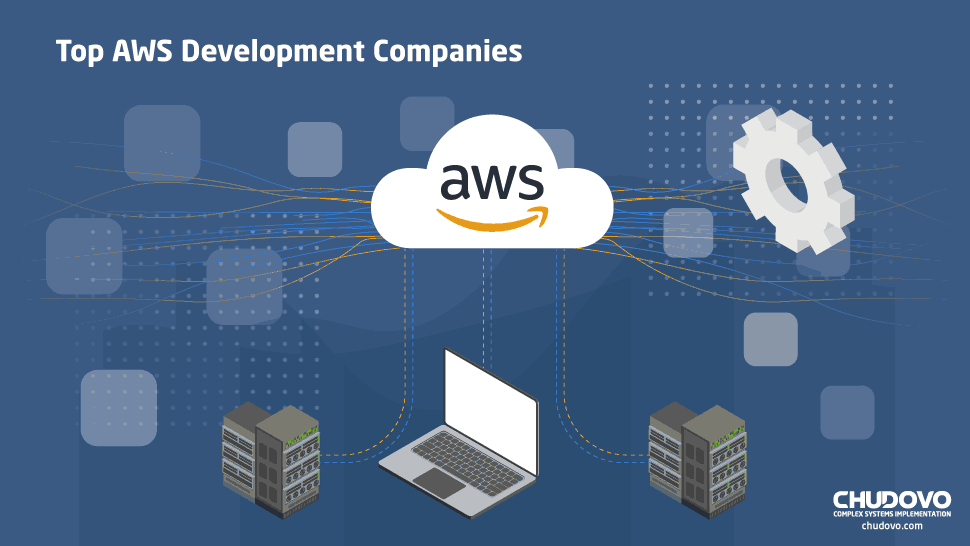Building Your Cloud Dream Team: The Ultimate Guide to Hiring Skilled AWS Developers
Cloud computing, with Amazon Web Services (AWS) leading the charge in today’s ever-advancing world. The search to hire AWS developers is a strategic move for companies that leverage cloud services for innovation and growth. An AWS developer brings expertise in navigating the AWS ecosystem and a thorough understanding of cloud computing principles, including designing, deploying, and managing scalable, secure applications.
Why AWS, you might ask? The platform’s reliability, scalability, and continuous advancement make it essential for businesses embracing cloud services. The decision to hire AWS developers is driven by the need for expertise in a platform that offers a comprehensive suite of services, from compute power and storage options to networking capabilities.
Whether augmenting an existing team or building a new one, navigating the challenges of AWS development and cloud services is essential. This article digs deep to provide a roadmap for businesses ready to start on the AWS journey.
Table of contents:
- Understanding the AWS Ecosystem
- Identifying Your AWS Developer Needs
- In-house vs. Freelance AWS Developers vs. Outsourcing
- The Ideal AWS Developer Profile
- Launching Your Search for AWS Talent: Networking Strategies
- Evaluating Candidates
- The Selection Process: Interview Techniques to Uncover the Best Candidates
- Onboarding Your AWS Developer
- Retention Strategies
- Conclusion
- Frequently Asked Questions (FAQs)
Understanding the AWS Ecosystem
Amazon Web Services (AWS) can initially seem daunting, but its comprehensive suite of offerings is the bedrock for modern software development in the cloud. At the forefront of AWS development is Amazon EC2 (Elastic Compute Cloud), which provides scalable computing capacity in the AWS cloud. This allows developers to launch virtual servers as needed. Similarly, Amazon S3 (Simple Storage Service) offers scalable object storage, making it a cornerstone for data storage solutions that AWS developers frequently rely upon.
Another pivotal service is AWS Lambda, enabling developers to run code responding to triggers without managing servers. For database management, services like Amazon RDS (Relational Database Service) and Amazon DynamoDB offer managed relational and NoSQL database services, respectively. These tools allow AWS-certified developers to set up, operate efficiently, and scale databases in the cloud, focusing on application development without the overhead of database administration.
Furthermore, Amazon VPC (Virtual Private Cloud) allows developers to provision a logically isolated section of the AWS cloud. This can launch AWS resources in a defined virtual network. Understanding these services—and why they’re imperative to working with AWS—is vital for anyone involved in the hiring process of Amazon Web Services developers. These services represent just the tip of the iceberg but are primary to cloud computing development.
Identifying Your AWS Developer Needs
Before starting the hiring process, it’s important to articulate why AWS is your chosen platform. Is it for its comprehensive services, its scalability, or the cost-effectiveness it offers through its pay-as-you-go pricing model? Answering this will help you pinpoint the reasons to hire AWS developers specific to your enterprise’s needs. For instance, if your project involves developing complex applications requiring serverless architectures, your focus might be finding developers with expertise in AWS Lambda.
AWS developers are not just coders or programmers. They are architects of the cloud, skilled in designing, deploying, and managing applications across the sprawling infrastructure that AWS provides. Their expertise spans various AWS tools and platforms, making them invaluable for businesses looking to innovate quickly and efficiently. Also, there is a wide set of programming languages for AWS.
When you hire AWS developers, you’re investing in professionals who can navigate the complexities of cloud services, implement best practices in cloud architecture, and leverage the latest AWS technologies. Their role goes beyond mere implementation; they are strategic partners who advise on optimizing resources, reducing costs, and enhancing system performance. This makes them integral to not just the development phase but the entire lifecycle of a cloud project.
Given the rates for AWS developers, it’s crucial to have a clear project scope that details your objectives, technical requirements, and expected outcomes. This clarity ensures that the AWS developers you bring on board can hit the ground running, equipped with a precise understanding of their role in achieving your business goals.
In-house vs. Freelance AWS Developers vs. Outsourcing
When building a cloud infrastructure, one of the strategic decisions you’ll face is whether to hire in-house AWS developers, engage freelance professionals, or opt for an outsource team. In-house AWS Developers offer the advantage of seamless integration into your company’s culture and ongoing projects. They can align with your business objectives, providing a consistent presence that adapts and evolves with your needs. An in-house team ensures direct control over your projects and facilitates easier collaboration across different departments. However, this approach often requires a significant upfront investment in recruitment, training, salaries, and ongoing costs associated with full-time employees.
On the other hand, Freelance AWS Developers provide flexibility and specialized expertise on a project-by-project basis. Hiring freelancers can be cost-effective, particularly for short-term projects or tasks requiring niche skills. This route allows you to scale your workforce up or down as needed without the long-term commitment associated with in-house staff. The challenge lies in finding reliable freelancers who are AWS-certified and have a proven track record. Additionally, managing a freelance workforce requires robust coordination and project management skills to ensure consistency and quality.
Outsourcing to a dedicated team of AWS developers offers a middle ground, combining the expertise and scalability of freelancers with the reliability and coordinated effort of an in-house team. Outsourcing partners specializing in AWS development can bring a depth of experience and resources to your projects, often with a more predictable cost structure. This option appeals to companies looking to accelerate development timelines or handle complex projects without expanding their internal workforce. However, choosing a reputable outsourcing partner is crucial to ensure communication and quality standards are met, keeping in mind the best practices in cloud services.
Deciding between an in-house, freelance, or outsource team hinges on several factors, including the project scope, budget constraints, technical requirements, and the strategic importance of the project to your core business. Each option has its pros and cons, and the best choice may vary depending on the specific demands of your project and the operational dynamics of your organization.
The Ideal AWS Developer Profile
First and foremost, technical expertise in AWS services is non-negotiable. This includes a deep understanding of AWS core services such as Amazon EC2, S3, RDS, Lambda, and VPC. However, beyond familiarity, leveraging these services to architect scalable, secure, and cost-efficient cloud solutions sets an exceptional AWS developer apart. AWS-certified professionals, particularly those with Solutions Architect, Developer, and SysOps Administrator certifications, often demonstrate a verified level of expertise that can be invaluable to your team.
Soft skills, such as problem-solving abilities, adaptability, and effective communication, are equally important. Cloud projects often require cross-functional collaboration. So, the ability to articulate complex cloud concepts to non-technical stakeholders and work harmoniously within a team is crucial.
Moreover, practical experience deploying real-world AWS solutions significantly indicates a developer’s capability. Look for candidates with a portfolio of projects demonstrating their proficiency in working with AWS and solving complex problems. These projects should highlight their ability to apply best practices in cloud architecture, security, and performance optimization.
Technical Skills and Expertise
A foundation of an AWS developer’s arsenal is proficiency in cloud computing principles and AWS services. This encompasses a deep understanding of computing, storage, database management, networking, and security services within AWS, such as EC2, S3, RDS, VPC, and IAM. Mastery of these services allows developers to design, deploy, and manage scalable, high-availability, and fault-tolerant systems on AWS.
AWS Certified developers often bring a verified level of expertise to the table. Certifications such as AWS Certified Solutions Architect, AWS Certified Developer, and AWS Certified SysOps Administrator are indicators of a developer’s commitment to their craft and in-depth knowledge of AWS best practices.
In addition to AWS-specific knowledge, the ideal candidate should possess a strong foundation in software development, including experience with coding languages relevant to AWS environments like Python, Java, and Node.js. Familiarity with DevOps practices, CI/CD pipelines, and automation tools like Jenkins or Travis CI is crucial for modern cloud development and deployment.
Moreover, practical experience with infrastructure as code (IaC) tools such as AWS CloudFormation or Terraform can distinguish candidates, showcasing their ability to manage AWS resources systematically and predictably. Knowledge of containerization and orchestration tools like Docker and Kubernetes further complements an AWS developer’s profile.
AWS Certifications Explained
The AWS Certified Cloud Practitioner certification offers a broad overview of cloud concepts and AWS services, ideal for individuals seeking to understand the cloud from a high level. While this certification is more general, it sets the stage for more specialized paths, ensuring that a candidate has a solid grounding in AWS fundamentals.
The AWS Certified Developer – Associate certification is more relevant for developer roles. It validates an individual’s ability to develop and maintain applications on AWS. Candidates are tested on their knowledge of core AWS services, uses, and basic AWS architecture best practices. This certification is a testament to a developer’s expertise in writing applications that natively leverage AWS services.
The AWS Certified Solutions Architect – Associate certification demonstrates an individual’s ability to design distributed systems on AWS. This certification covers network technologies, AWS-based application deployment, and security concepts crucial for developers planning and architecting scalable, fault-tolerant systems. For more advanced roles, the AWS Certified Solutions Architect – Professional certification delves deeper into complex solutions crafted on AWS.
AWS Certified DevOps Engineer – Professional certification is another critical credential, especially for roles focusing on software development and operations (DevOps). It showcases an individual’s ability to manage distributed applications in AWS, covering automation, continuous integration & delivery (CI/CD), and monitoring & logging practices.

Launching Your Search for AWS Talent: Networking Strategies
Networking strategies are crucial in discovering and attracting AWS developers, those specialized professionals who can architect, deploy, and optimize cloud solutions. Professional networking events and conferences dedicated to cloud computing service and AWS specifically offer fertile ground for connecting with AWS developers. These events are not just about the latest developments in cloud technology but also serve as a hub for like-minded professionals to share ideas, challenges, and solutions. Engaging in these gatherings can provide direct access to potential candidates who are actively involved in the AWS community and are often AWS-certified.
Online forums and communities like GitHub, Stack Overflow, and the AWS Developer Forums are invaluable resources for identifying talent. These platforms allow you to observe developers in action, solve problems, and contribute to discussions around AWS services and best practices. Participation in these communities can also offer insights into a developer’s problem-solving approach and willingness to engage in the broader developer ecosystem.
Social media platforms like LinkedIn and Twitter are powerful tools for networking with AWS professionals. LinkedIn, focusing on professional networking, allows for targeted searches for AWS developers based on experience, certifications, and specific skills. Engaging with potential candidates through these platforms, whether by direct outreach or participation in relevant groups and discussions, can effectively build relationships with top talent.
Furthermore, tapping into the AWS Partner Network (APN) can lead to connections with firms and individuals who have demonstrated high levels of technical proficiency and innovation in using AWS. Partners in this network have access to additional resources and training from AWS. They often seek opportunities to collaborate on projects, offering a pathway to hire AWS developers with a proven track record.
In addition to these strategies, word of mouth and employee referrals remain potent tools. Encouraging your current team members to refer professionals within their network can lead to high-quality hires, as these candidates come pre-vetted to some extent by people whose judgment you trust.
Job Boards and Recruitment Platforms: Posting and Searching
Job boards and recruitment platforms have become indispensable tools for hiring AWS developers. These platforms offer a dual advantage: they allow organizations to cast a wide net in their search for talent while providing a focused arena to connect with professionals specialized in Amazon Web Services (AWS) development.
When posting a job listing, clarity and specificity are key. A well-crafted job description outlines the technical requirements—such as proficiency in AWS services, experience with cloud computing, and familiarity with best practices in AWS development—and highlights the soft skills and cultural fit necessary to your organization. Mentioning certifications, like AWS Certified Solutions Architect or AWS Certified Developer, can attract candidates who have validated their expertise through AWS’s rigorous certification process.
Searching for AWS developers on these platforms requires a strategic approach. Utilize filters and keywords such as “AWS developer,” “cloud services,” and “software development” to refine your search results. Many job boards and recruitment platforms offer advanced search options to narrow down candidates based on location, experience level, and specific skills like understanding AWS, working with AWS, and being AWS certified.
Engaging with Professional Recruiters
Professional recruiters understand the nuances of what makes an effective AWS developer. They are adept at navigating the complexities of skills and certifications needed for specialized cloud projects, making them an essential partner in the hiring process. Recruiters can articulate why AWS is a critical component of your tech stack and highlight the pros of AWS to potential candidates.
A key advantage of working with recruiters is their ability to streamline the search for Amazon Web Services developers. They can pre-screen candidates for essential skills—such as understanding AWS, working with AWS, software development practices, and familiarity with cloud services—saving your internal team significant time and resources. Furthermore, recruiters can negotiate rates for AWS developers on your behalf, ensuring that you secure top talent within your budget constraints.
Recruiters also bring a deep understanding of the market and can provide insights into best practices for attracting AWS professionals. They can advise on competitive compensation packages, career development opportunities, and other factors that AWS developers consider when choosing their next opportunity.
Evaluating Candidates
A detailed evaluation strategy ensures that you hire AWS developers with the right skills and individuals who will thrive in your organizational culture and contribute to your projects’ success. The technical evaluation should begin with verifying the candidate’s proficiency in the core Amazon Web Services (AWS). AWS-certified candidates often have a proven baseline of knowledge, but delving into their practical experience with cloud computing service and software development methodologies and their ability to leverage AWS for solving complex problems is crucial.
However, soft skills and cultural fit are equally important. Evaluate candidates on their problem-solving abilities, teamwork and collaboration capacity, and communication skills. Understanding how they’ve navigated challenges in past projects can give you a glimpse into their approach to work and how they might integrate with your existing team.
When discussing rates for AWS developers, it’s essential to clearly understand the market and balance competitive compensation with the value the candidate brings to the team. This negotiation should be transparent and reflect the candidate’s expertise and the potential for growth and contribution to your projects.
Screening for Technical Skills: Resumes and Portfolios
Screening for technical skills through resumes and portfolios is a critical stage in the hiring process for AWS developers. This step allows you to assess the depth and breadth of a candidate’s experience and expertise in Amazon Web Services and related cloud technologies.
When reviewing resumes, look for clear indicators of AWS development experience. This includes specific mentions of AWS services the candidate has worked with, such as Amazon EC2, S3, RDS, Lambda, and DynamoDB. Experience with these services suggests a solid foundation in AWS and the ability to leverage its capabilities in software development projects. Additionally, pay attention to the duration and complexity of the projects listed, as they can provide insight into the candidate’s depth of experience.
AWS certifications are another crucial factor to consider. Certifications such as AWS Certified Developer – Associate, AWS Certified Solutions Architect – Associate, or AWS Certified SysOps Administrator – Associate validate a candidate’s knowledge and skills in designing, deploying, and operating applications and infrastructure on AWS.
Portfolios, whether linked directly on the resume or provided upon request, offer a tangible showcase of the candidate’s work. Look for projects that demonstrate innovative use of AWS services to solve real-world problems or enhance applications’ functionality and scalability. Projects that include source code or detailed case studies can give you a deeper understanding of the candidate’s technical abilities, problem-solving skills, and creativity.
Conducting Technical Interviews and Assessments
A well-structured technical interview can provide deep insights into a candidate’s capabilities, ensuring they are proficient in AWS services and a good fit for your team’s culture and project requirements.
When preparing for technical interviews, it’s essential to include questions that cover a broad spectrum of topics related to AWS development. Questions should assess the candidate’s understanding of core AWS services, such as EC2 for computing, S3 for storage, RDS for databases, and Lambda for serverless computing. Probing their knowledge on how to architect scalable, secure, and cost-efficient solutions using AWS can reveal their depth of understanding and ability to apply best practices in real-world scenarios.
In addition to verbal questioning, practical assessments can play a pivotal role in evaluating a candidate’s technical skills. Consider incorporating coding challenges or system design exercises that require the candidate to solve problems using AWS services. These assessments can be conducted live during the interview or as take-home assignments. They offer candidates the opportunity to demonstrate their software development prowess, familiarity with cloud computing concepts, and proficiency in leveraging AWS for building and deploying applications.
Another vital aspect to explore during technical interviews is the candidate’s experience with DevOps practices and tools, given their importance in modern cloud-based software development. Understanding their familiarity with continuous integration and continuous deployment (CI/CD) pipelines, infrastructure as code (IAC), and monitoring and logging practices within AWS can provide insights into their ability to efficiently manage and automate AWS deployments.
The Selection Process: Interview Techniques to Uncover the Best Candidates
The interview process is not just about assessing technical expertise; it’s an art that involves peeling back layers to understand the candidate’s problem-solving abilities, adaptability, and fit within your team’s culture.
- Behavioral Interviewing
This technique involves asking candidates to describe past professional situations, which helps them understand how they’ve applied their technical skills, dealt with challenges, and collaborated with teams. For an AWS developer, questions might include scenarios where they had to optimize AWS resources for cost and efficiency or navigate complex migration projects. The aim is to gauge what the AWS developer does and how they think, solve problems, and learn from experiences.
- Technical Deep Dives
A critical interview component should be dedicated to technical discussions exploring the candidate’s hands-on experience with AWS services. This can include walkthroughs of architecture designs they’ve implemented, discussions of how they’ve leveraged different AWS services in software development projects, and their approach to ensuring security and compliance in the cloud.
- Situational Questions
Presenting hypothetical but realistic work scenarios can help assess how candidates would handle specific challenges or tasks related to AWS development. For instance, ask how they would design a scalable application using AWS services for a given set of requirements or how they would troubleshoot a performance issue. This technique tests their critical thinking, working knowledge of AWS, and their approach to software development and problem-solving in a pressurized environment.
- Culture Fit and Motivation
Understanding why candidates are interested in working with AWS and in your specific projects is essential. Discussing what drives them, their career aspirations, and how they see themselves contributing to your team can provide insights into their motivation and potential for long-term engagement. This aligns with understanding why AWS is their platform of choice, highlighting their passion for cloud technologies.
Negotiating Offers: Salary, Benefits, and Beyond
Negotiating offers with potential AWS developers is a crucial step in the hiring process, where the employer’s and candidate’s goals and expectations converge. This phase is about agreeing on a salary and aligning on benefits, growth opportunities, and the mutual value proposition. A well-negotiated offer sets the foundation for a productive, long-lasting professional relationship crucial for building your cloud dream team.
Before entering negotiations, it’s essential to understand the current market rates for AWS developers clearly. Factors such as experience, certifications (like being AWS certified), technical skills, and the complexity of projects they will be working on can influence these rates. Benchmarking against industry standards helps make competitive offers that reflect the developer’s value to your team while ensuring fairness and transparency.
Moreover, When discussing compensation with an AWS developer, consider the scope of their responsibilities, the skills AWS developers must possess, and how their role contributes to achieving business objectives. It’s essential to be flexible yet firm, offering a competitive package that is commensurate with their experience and the value they offer.
Beyond salary, benefits and growth opportunities play a critical role in attracting and retaining top talent. Tailoring benefits to meet the needs of AWS developers can make your offer more attractive. This could include professional development opportunities, such as sponsoring AWS certifications or conferences, flexible working arrangements, health and wellness programs, and other perks contributing to a positive work-life balance. Discuss potential career paths, project types, and the technologies they’ll be working with. Emphasizing how they can make a significant impact through their work with AWS services and contribute to the organization’s success can be a powerful motivator.

Certified engineers
Convenient rates
Fast start
Profitable conditions
Agreement with
EU company
English and German
speaking engineers
Onboarding Your AWS Developer
Onboarding your AWS Developer is a critical phase that sets the tone for their tenure at your organization. Start with a comprehensive orientation that covers the administrative aspects of joining a new company and a deep dive into the company’s mission, values, and critical projects. Understanding what an AWS developer does within your company’s context helps new hires see where they fit in the larger picture. This is also the time to introduce them to the services AWS provides that they will be working with, ensuring they understand the tools at their disposal.
Given the technical nature of their role, AWS developers require a structured technical onboarding that includes detailed overviews of the current AWS development projects, the architecture of your cloud environment, and the best practices your team follows. Pairing the new developer with a mentor can facilitate this process, providing them with a go-to person for their questions and concerns as they navigate their new role.
That’s not all! Ensure that AWS developers have access to tools, cloud services, and documentation. This includes setting up their workstations, granting permissions to relevant AWS resources, and providing any AWS-certified training materials that can help bridge knowledge gaps. Encouraging them to explore AWS services and tools they might need to become more familiar with can spur innovation and growth.
Not to forget, cultivating a sense of belonging and teamwork is essential for new hires. Schedule meet-and-greets with other team members, including those they will work closely with on projects. Understanding the team dynamics and how their role as an AWS developer contributes to the team’s goals can foster a collaborative working environment. Establish a feedback loop early, offering regular check-ins to discuss the new hire’s progress, challenges, and suggestions. Providing support and addressing any issues promptly can ensure a smooth transition and integration into the team.
Training and Development for AWS Skills Enhancement
For AWS developers, the journey of learning never truly ends. The question, “What does an AWS developer do?” today might elicit a different response tomorrow, given the rapid pace of technological advancements in cloud services. Certification courses such as AWS Certified Solutions Architect, AWS Certified Developer, and AWS Certified SysOps Administrator offer tangible benchmarks for skills enhancement and are highly regarded in the industry.
Moreover, fostering an environment that encourages exploration and innovation is vital. Encourage your team to attend workshops, webinars, and conferences focusing on the latest AWS development trends and cloud computing trends. This broadens their understanding and skills and brings fresh perspectives and ideas to your projects. Offering time and resources for developers to work on personal projects or contribute to open-source projects using AWS can also spur creativity and innovation.
Retention Strategies
At the core of effective retention is recognizing each AWS developer’s contributions and providing opportunities for professional growth. Creating a motivating workplace for AWS developers involves fostering an environment that challenges and engages them with exciting projects and cutting-edge technologies. Encourage autonomy and innovation by allowing developers to take ownership of their projects and explore new solutions within the AWS ecosystem. Cultivate a culture that celebrates successes, learns from failures, and supports risk-taking.
Additionally, offering career advancement opportunities and focusing on professional growth is key to retaining top AWS talent. Implement clear career pathways that allow developers to progress based on their skills, contributions, and interests, whether advancing in technical expertise, project management, or leadership roles. Support their growth through continuous learning opportunities, such as funding for AWS certifications, attending workshops, and participation in industry conferences.
Conclusion
Building your cloud dream team by hiring skilled AWS developers is a multifaceted process that extends beyond mere technical capabilities. It involves crafting compelling job descriptions, employing strategic interview techniques, and implementing best practices for onboarding and integration. Moreover, fostering a collaborative and innovative team environment and focusing on continuous learning and professional growth is essential. By adhering to these strategies, you can assemble a team of AWS developers who are both technically proficient and deeply engaged and committed to driving your cloud projects to success.
Frequently Asked Questions (FAQs)
What qualifications should I look for when hiring an AWS Developer?
When hiring an AWS Developer, look for a combination of technical skills and certifications, such as AWS Certified Solutions Architect or AWS Certified Developer, along with experience in cloud computing, software development, and familiarity with AWS services and best practices. Additionally, assess their problem-solving abilities, teamwork, and adaptability to ensure they can contribute effectively to your cloud projects.
How can I ensure the AWS Developer I hire fits my team well?
To ensure a good fit, focus on cultural alignment and soft skills during the hiring process. Assess candidates’ communication skills, ability to collaborate within teams, and alignment with your company’s values and work ethic. Incorporating team interviews and practical assessments can also provide insights into how well they integrate with your existing team and handle real-world projects.
What strategies can I use to retain top AWS Developer talent?
Retaining top AWS Developer talent involves creating a motivating work environment, offering career advancement opportunities, and focusing on professional growth. Implement regular reviews and feedback loops, support continuous learning through certifications and training, and ensure competitive compensation.
If you need highly skilled AWS developers at the right price for your project, contact us now!






